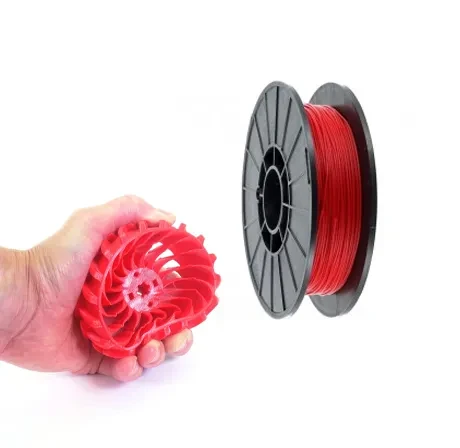
NinjaFlex is a flexible filament that is used in FDM 3D printing. It is made from a thermoplastic polyurethane (TPU) material, which gives it its flexibility. NinjaFlex is a popular choice for 3D printing projects that require a flexible material, such as phone cases, gaskets, and robotic parts.
NinjaFlex is easy to print with most FDM 3D printers. It does not require a heated bed and can be printed at a variety of temperatures. However, it is important to use a direct drive extruder and to print at a slower speed when using NinjaFlex. This will help to prevent the filament from oozing and will result in a more consistent print.
NinjaFlex is commonly used to create wearable technology accessories such as flexible bands, straps, and customized grips. Its flexibility and softness make it comfortable to wear and conform to the body.
NinjaFlex is suitable for creating parts in robotics and prosthetics that require flexible joints, grippers, and tactile components. Its elasticity allows for better movement and gripping capabilities.
NinjaFlex is often used for prototyping and design validation of products that will be manufactured using flexible materials or require flexible features. It allows designers to test and iterate on their designs before committing to final production.
NinjaFlex is popular in educational settings and art projects due to its ability to create unique and intricate flexible structures. It allows students and artists to explore creative possibilities and push the boundaries of what can be achieved with 3D printing.
NinjaFlex finds use in various industrial applications where flexible and durable parts are required. It can be used to produce gaskets, seals, vibration dampeners, and other components that need to withstand repeated movements and environmental conditions.
NinjaFlex is often employed in creating protective cases, bumpers, and cushioning elements for electronic devices, tools, and equipment. Its shock-absorbing properties help protect delicate components and absorb impact.
| Property | Value |
|---|---|
| Tensile Strength | 26MPa |
| Elongation at Break | 660% |
| Layer Thickness | 0.2mm |
| Standard Tolerance | +/-0.05mm |
| Melting Temperature | 216°C |
| Density | 1040 kg/m3 |
| Impact Strength | 4.2 kJ/m2 |
| Shore Hardness | 85A |